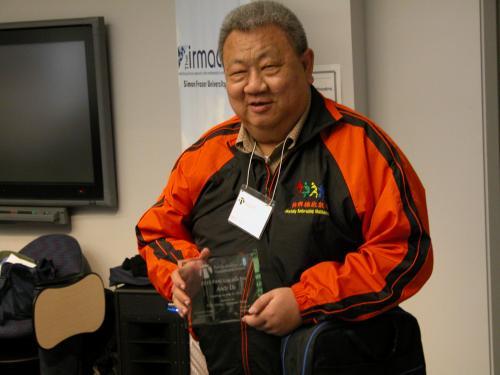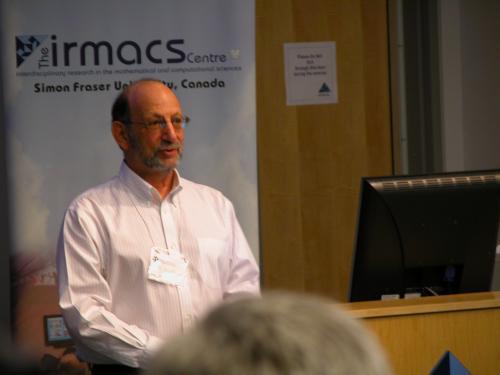Changing the Culture 2010
Topic
Resources And How We Use Them (Or Not)
Details
Friday, May 21, 2010
IRMACS theatre, SFU Burnaby
8888 University Drive
Burnaby, British Columbia V5A 1S6
Canada
This Year's Changing The Culture Conference is linked with the 2010 CMESG meeting, which will be taking place at SFU Burnaby May 21 - 25. Please check back for more information, or contact the conference organizer, Malgorzata Dubiel (dubiel at math.sfu.ca).
The conference is free, but space is limited, and therefore registration is required.
Online registration is now closed.
Conference Program
8:00 Registration, IRMACS Atrium
8:45 Opening Remarks, IRMACS 10900
9:00 Plenary Talk, Cynthia Nicol, University of British Columbia
Title: Living Culturally Responsive Mathematics Education: Purpose, Possibilities and Place.
Abstract: Culturally responsive education is not new. But how is it lived and how might it be a process of transformative education? In this talk I explore how culturally responsive mathematics education is lived in two different contexts (one rural and one urban) with learners and their teachers. Drawing upon examples of experiences with teachers and classrooms, this talk will provide a context for thinking about cultural responsiveness, decolonization, social justice and mathematics curriculum and pedagogy.
10:00 Coffee Break, IRMACS Atrium
10:30 Workshops AB
Workshop A: Bar Model Method for Problem Solving in MathLocation: Room K9509
Leader: Melania Alvarez Adem (PIMS),
Natasa Sirotic (Southpointe Academy)
Abstract: This workshop will explore how the Bar Model method can be used not only as a problem solving technique, but also to develop in students a deeper understanding of fundamental concepts in mathematics. By using the Bar Model, students are able to construct a pictorial representation of known and unknown quantities and their relationships in a problem, and develop their abilities in problem solving and mathematical thinking. The Bar Model Method is a key feature of the Singapore mathematics curriculum, which has received increasing attention since Singapore attained first place in TIMSS in 1995, 1999 and 2003.
Workshop B: Students Misconceptions about Math: Where Do They Start?Location: IRMACS 10900
Leaders: Bernice Kastner, SFU and Teri Raymond
Abstract: A close look at school textbooks and curriculum materials reveals that they often contribute to student mathematics misconceptions. Should we teach students things that they will eventually have to "unlearn"?
This workshop will examine examples of errors, ambiguities and misleading statements in elementary mathematics textbooks, and how they impact student understanding of concepts throughout high school and beyond. Participants are invited to bring examples of student misunderstandings about mathematical concepts, from any level of school mathematics. Can introductory instruction be designed to make it easier for students to get it right from the beginning?
This workshop will be of interest to mathematics teachers at any level, including post secondary. Understanding how mathematical misconceptions arise can make it easier to help students to "unlearn" them.
12:00 PIMS Award Ceremony: Presentation of the 2010 PIMS Education Prize to Prof. Andy Liu (University of Alberta), IRMACS 10900
12:30 Lunch, IRMACS Atrium
13:30 Who Is Doing Your Students Homework, And Should You Be Concerned? Jamie Mulholland, SFU IRMACS 10900
Abstract: Last year a new kid showed up on the block, and this kid has the ability to impact education forever. If asked, this kid will answer a vast array of computational questions, quickly, correctly and also provide a detailed solution, and he won't even ask for your lunch money. If your students don't know him, they soon will, and so this begs the question: Who is doing their homework, and should we be concerned?
This new kid is the computational knowledge engine Wolfram Alpha. It has a website with a query field where one's ability to do computations, ranging from the very simple to quite complex, are only a click away.
What is the potential impact that Wolfram Alpha will have on education? How do we ensure this impact is positive? What can we do now prepare ourselves?
If you have used Wolfram Alpha please bring your ideas/examples of how it has influenced your teaching. Discussion of these topics will continue throughout the talk and the following panel discussion.
14:30 Panel Discussion, IRMACS 10900
Panel Members: Katharine Borgen (UBC), Andy Liu (U Alberta), John Grant McLoughlin (UNB), Jamie Mulholland (SFU)
16:00 Ambiguity and Mathematical Thinking, William Byers, Concordia University WMC 3520 (Jointly with CMESG 2010)
Abstract: "Mathematics teaches you to think!" We have all made this comment and, if we take it seriously, it has a great impact on how we teach. But what kind of thinking do we have in mind when we make this claim? Is there only one kind of thinking that is at play when we do mathematics? Many people feel that mathematical thinking is logical, linear, and, above all, clear. Let's call this way of thinking "simple". I will claim that (in the words of the French sociologist and philosopher of science Edgar Morin) mathematics uses "complex" thinking. One of our aims is to explore some aspects of complex thinking.
How the mind is used in mathematics leads directly to a picture of what mathematics is and what mathematics education is all about. Mathematics is primarily about ideas, not facts, techniques, or logic. If this is so then mathematics at all levels is fundamentally a domain of creativity and should be approached as such. You can't memorize ideas, you have to "get" them and this "getting" is an act of creativity. There is no formula for creativity; it is a process that is inherently discontinuous. Every mathematical situation needs to be approached through the question, "what is going on here?" that is, "what is the basic idea in this mathematical situation?"
Approaching mathematics from the perspective of ambiguity and mathematical ideas (the two are connected) leads to a different picture of what mathematics is and, as a consequence, how it should be learned and taught.
18:00 Reception (Jointly with CMESG 2010)
Photographs

